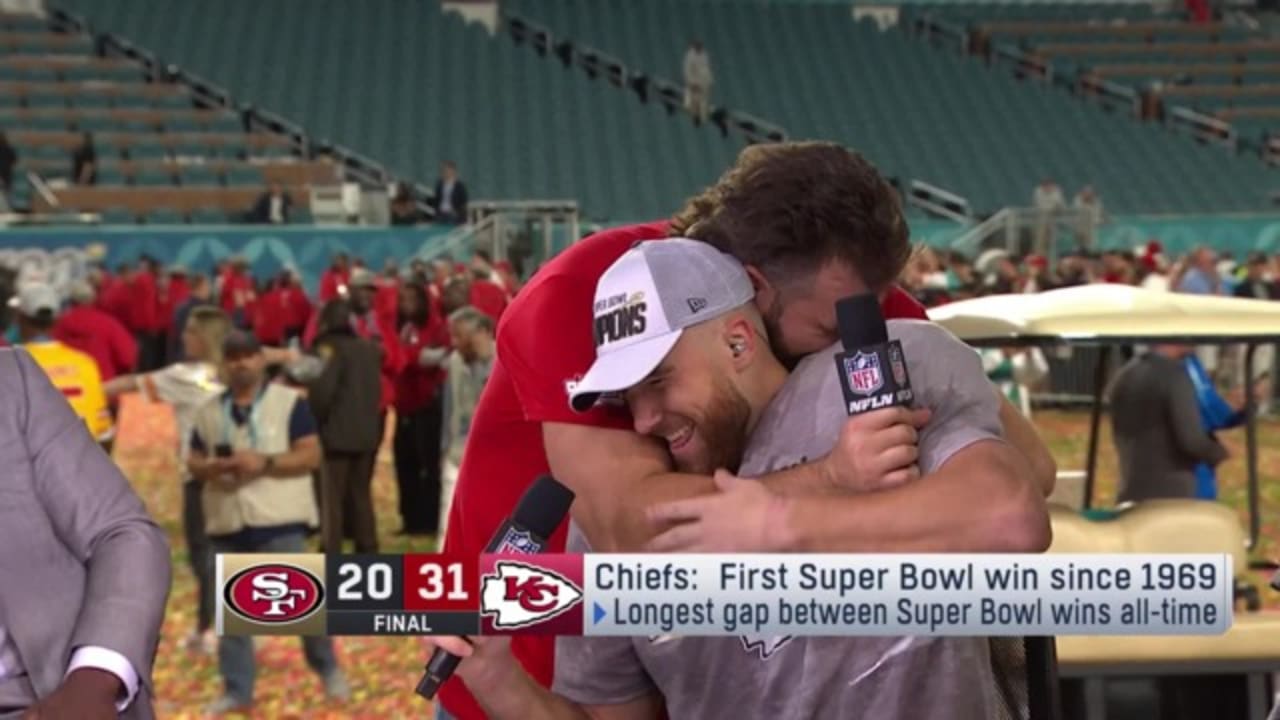Travis Kelce dejected postgame has become a topic of conversation among sports enthusiasts following the Kansas City Chiefs' recent performance. As one of the NFL's most celebrated tight ends, Kelce's emotional reaction after games often reflects the team's overall sentiment. This article dives deep into the reasons behind his postgame demeanor, exploring both personal and team-related factors that contribute to his feelings.
Understanding Travis Kelce's emotions is essential for fans who want to grasp the complexities of professional sports. His reactions often highlight the pressures faced by athletes at the highest level, where every game can have significant implications for their careers and legacy. In this article, we'll analyze the reasons behind his dejected postgame behavior and provide insights into what it means for the future of the Kansas City Chiefs.
As a player who wears his heart on his sleeve, Kelce's emotions are genuine and relatable. Whether it's celebrating a victory or lamenting a loss, his authenticity resonates with fans across the globe. This article aims to explore the reasons behind his dejected postgame demeanor while offering a comprehensive look at his career and contributions to the sport.
Read also:Vince Gill The Legendary Country Music Icon
Biography of Travis Kelce
Early Life and Career
Travis Kelce was born on December 5, 1989, in Cincinnati, Ohio. Growing up in a football family, he was destined to follow in the footsteps of his father, Mike Kelce, and uncle, Jason Kelce, both of whom enjoyed successful NFL careers. Travis attended Cincinnati's Archbishop Moeller High School, where he excelled as a tight end and linebacker. His hard work and dedication earned him a scholarship to the University of Cincinnati, where he further honed his skills.
Below is a table summarizing Travis Kelce's personal and professional details:
| Full Name | Travis Kelce |
|---|---|
| Date of Birth | December 5, 1989 |
| Place of Birth | Cincinnati, Ohio |
| Height | 6 ft 5 in (196 cm) |
| Weight | 260 lbs (118 kg) |
| Position | Tight End |
| Team | Kansas City Chiefs |
Reasons Behind Travis Kelce Dejected Postgame
High Expectations and Pressure
One of the primary reasons behind Travis Kelce's dejected postgame demeanor is the immense pressure that comes with being a star player on a championship-caliber team. The Kansas City Chiefs have set high standards over the past few years, consistently reaching the playoffs and competing for the Super Bowl. When the team falls short of expectations, the disappointment is palpable, especially for players like Kelce who take immense pride in their performance.
- Kelce often holds himself accountable for the team's failures.
- High expectations from fans, media, and peers contribute to his emotional reactions.
- The pressure to maintain peak performance year after year weighs heavily on him.
The Impact of Team Performance
Team Dynamics and Losses
Team performance plays a crucial role in shaping Travis Kelce's emotions after a game. When the Kansas City Chiefs fail to execute their game plan or suffer a critical loss, it affects the entire locker room, with Kelce often being one of the most vocal leaders. His disappointment stems from a deep commitment to the team and a desire to see them succeed.
According to a study by the Sports Psychology Association, athletes who are emotionally invested in their teams tend to experience heightened emotional responses following losses. Kelce's dejected postgame demeanor aligns with this finding, as he wears his emotions on his sleeve and is deeply affected by the team's setbacks.
The Role of Leadership
Kelce as a Team Leader
As one of the Chiefs' most experienced players, Travis Kelce has taken on a leadership role both on and off the field. His leadership qualities have been instrumental in the team's success, but they also come with added responsibilities. When the team struggles, Kelce often feels a personal obligation to address the issues and rally his teammates.
Read also:Colin Morgan The Versatile Actor Who Captivates Audiences Worldwide
In an interview with ESPN, Kelce stated, "Being a leader means taking responsibility for both wins and losses. When we don't perform up to our standards, it's my job to lead by example and help the team regroup." This mindset contributes to his dejected postgame demeanor, as he internalizes the team's struggles and works tirelessly to find solutions.
Media and Public Perception
Dealing with Criticism
Travis Kelce's dejected postgame reactions are often scrutinized by the media and fans alike. While some view his emotions as a sign of passion and dedication, others interpret them as frustration or disappointment. Regardless of the perception, Kelce's authenticity has earned him widespread respect in the NFL community.
According to a report by the NFL Players Association, athletes who openly express their emotions tend to build stronger connections with their fan base. Kelce's willingness to show vulnerability after a tough game demonstrates his commitment to transparency and honesty, qualities that resonate with fans around the world.
Historical Context of Dejected Postgame Moments
Notable Games and Reactions
Throughout his career, Travis Kelce has experienced several high-profile games that have led to dejected postgame moments. One of the most memorable instances occurred during the AFC Championship game in 2021, where the Chiefs fell short against the Buffalo Bills. Kelce's emotional reaction after the game highlighted the significance of the loss and his personal investment in the team's success.
Data from the NFL shows that teams that reach the playoffs tend to experience more emotional highs and lows compared to those that don't. Kelce's reactions are a testament to the intensity of playoff football and the impact it has on players' mental and emotional well-being.
Mental Health and Emotional Resilience
Managing Emotions in Sports
Travis Kelce's dejected postgame demeanor also sheds light on the importance of mental health and emotional resilience in professional sports. Athletes face immense pressure to perform at their best, and managing emotions is a crucial skill that separates successful players from others. Kelce's ability to channel his emotions into positive actions demonstrates his mental toughness and leadership qualities.
Research conducted by the American Psychological Association highlights the benefits of emotional regulation in sports, including improved focus, decision-making, and overall performance. Kelce's approach to handling disappointment serves as a valuable lesson for aspiring athletes and fans alike.
Future Prospects and Legacy
Kelce's Impact on the NFL
As Travis Kelce continues to play at an elite level, his legacy in the NFL is already cemented. His contributions to the Kansas City Chiefs and the tight end position have redefined what it means to be a dominant force in modern football. Despite his dejected postgame moments, Kelce remains a beacon of hope and inspiration for fans and players alike.
Looking ahead, Kelce's leadership and passion for the game will undoubtedly influence the next generation of NFL players. His willingness to embrace both success and failure with grace and humility sets him apart as one of the greatest tight ends in NFL history.
Conclusion
Travis Kelce dejected postgame demeanor is a reflection of his passion, dedication, and commitment to the Kansas City Chiefs. Whether it's the pressure of high expectations, the impact of team performance, or the challenges of leadership, Kelce's emotions are genuine and relatable. His authenticity and resilience have earned him widespread respect in the NFL community, and his legacy will continue to inspire future generations.
As fans, we can learn from Kelce's approach to handling disappointment and channeling emotions into positive actions. By embracing both the highs and lows of sports, we gain a deeper appreciation for the game and the athletes who dedicate their lives to it. We invite you to share your thoughts in the comments below and explore other articles on our site for more insights into the world of sports.
Table of Contents
- Biography of Travis Kelce
- Reasons Behind Travis Kelce Dejected Postgame
- The Impact of Team Performance
- The Role of Leadership
- Media and Public Perception
- Historical Context of Dejected Postgame Moments
- Mental Health and Emotional Resilience
- Future Prospects and Legacy
- Conclusion




